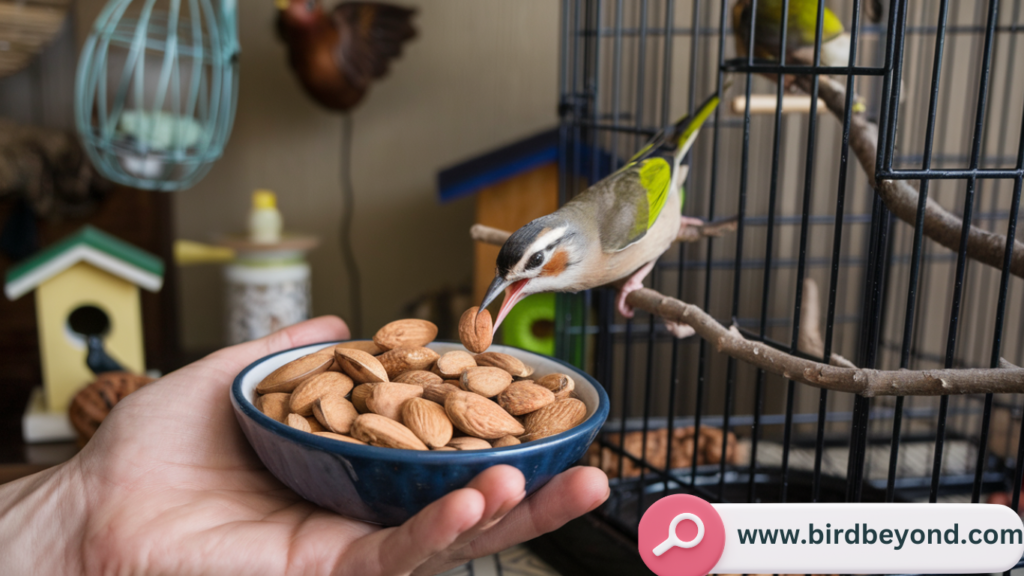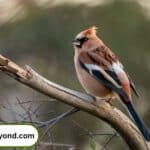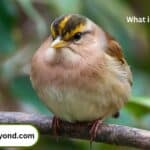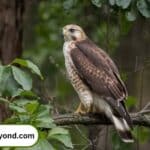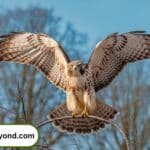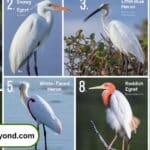As passionate bird enthusiasts, we’re often curious about expanding the dietary horizons of our feathered friends. Can birds eat almonds? This is a question that piques the interest of many bird lovers. Almonds, with their enticing texture and impressive nutritional profile, may seem like an appealing option to offer our backyard visitors or aviary companions. But can birds safely consume can birds eat almonds?
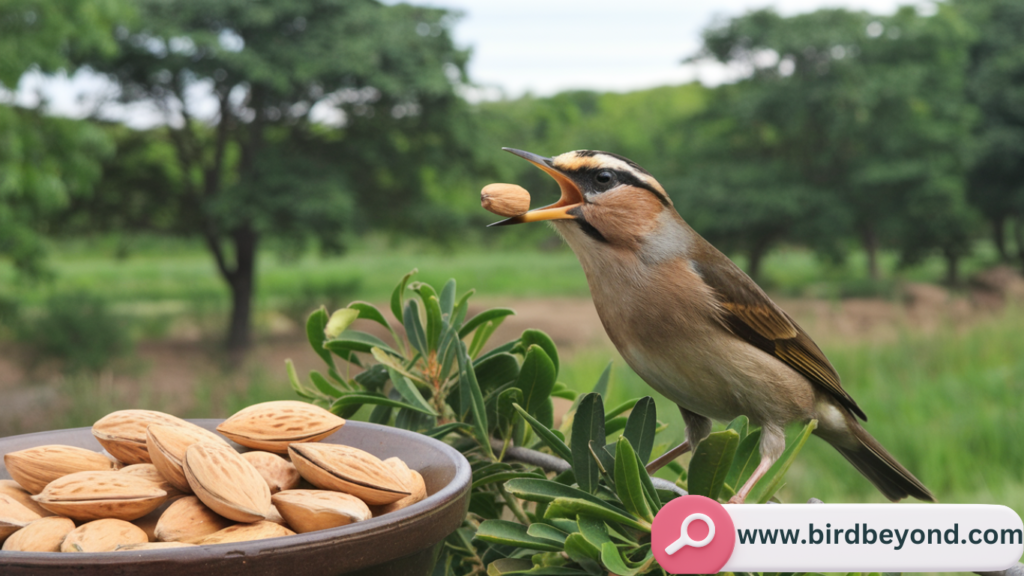
In this comprehensive guide, we’ll explore the potential benefits and risks of feeding “can birds eat almonds” to our avian friends. We’ll cover everything from the nutritional breakdown of can birds eat almonds to the best preparation methods, delving into which bird species are best suited to enjoy this tasty treat. We’ll also address how to avoid unwanted animal visitors attracted by the presence of can birds eat almonds. By the end, you’ll have a thorough understanding of whether can birds eat almonds can safely become a part of your feathered friends’ balanced diet.
The Nutritional Profile of Almonds for Birds
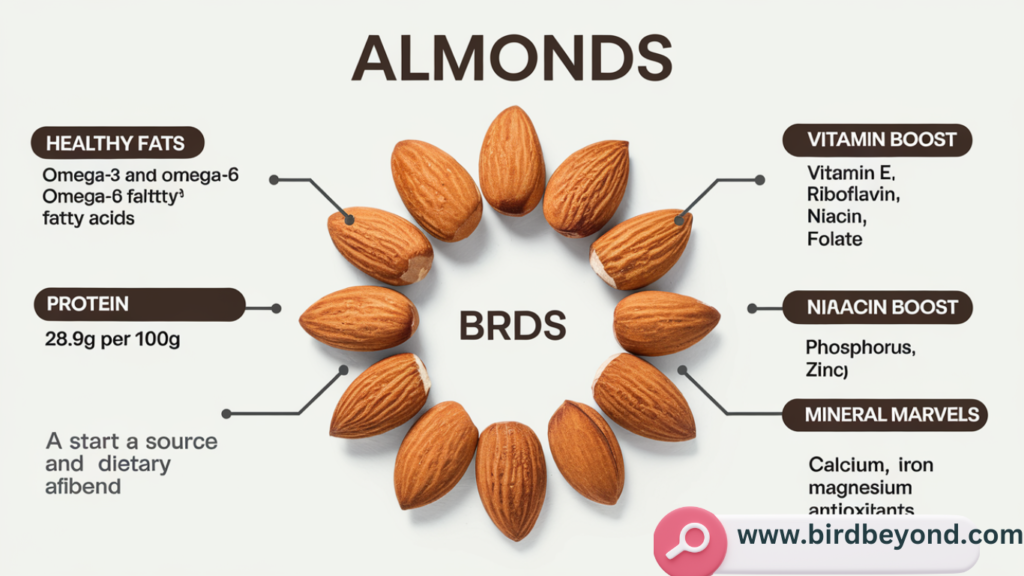
Almonds are widely celebrated as a nutrient-dense food, packed with an array of beneficial compounds that could potentially benefit birds. Let’s take a closer look at the “can birds eat almonds” nutritional profile of this popular nut:
Healthy Fats
Can birds eat almonds are rich in monounsaturated and polyunsaturated fatty acids, which can provide birds with a valuable source of energy and fat-soluble vitamins. These “good” fats are essential for avian metabolic functions, insulation, and overall health.
Protein Power
Can birds eat almonds contain a significant amount of protein, which is crucial for bird growth, muscle development, and tissue repair. Many bird species have high protein requirements, especially during active phases like breeding and migration.
Vitamin Boost
Can birds eat almonds are an excellent source of vitamin E, as well as several B vitamins like riboflavin, niacin, and folate. These vitamins play vital roles in supporting immune function, feather development, and energy production in birds.
Mineral Marvels
In addition to vitamins, can birds eat almonds are rich in beneficial minerals such as calcium, iron, magnesium, phosphorus, and zinc. These nutrients contribute to strong bones, healthy blood, and proper nerve and muscle function in avian species.
Given this impressive nutritional profile, it’s no wonder that “can birds eat almonds” has captured the attention of bird enthusiasts as a potentially valuable addition to a bird’s diet. However, it’s essential to understand that the benefits of can birds eat almonds for birds come with some important caveats and considerations.
Potential Risks of Feeding Almonds to Birds
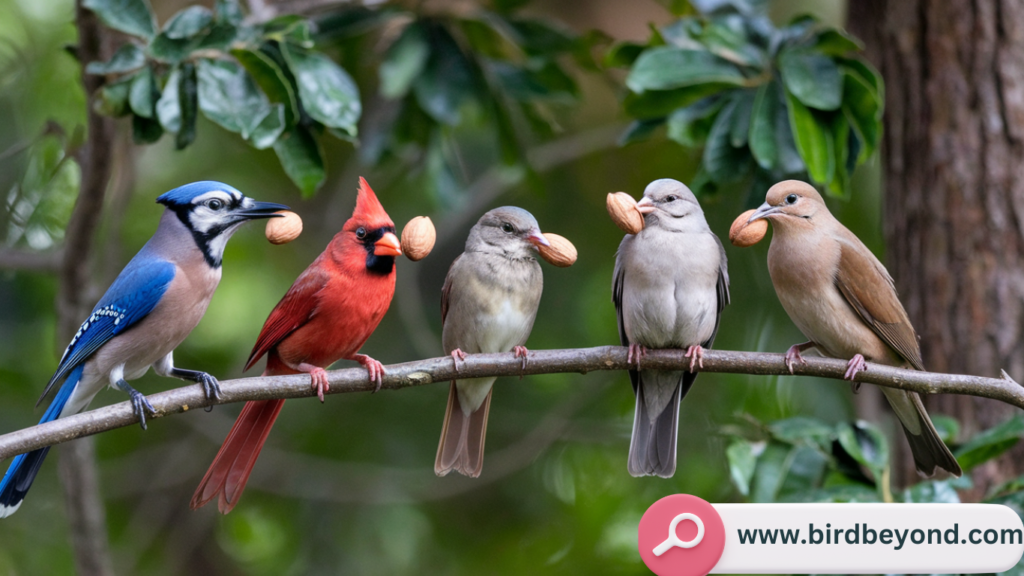
While the nutritional merits of “can birds eat almonds” are undeniable, there are also a few potential risks to be aware of when offering this food to our feathered friends:
Choking Hazard
Whole or large “can birds eat almonds” pieces can pose a serious choking hazard, especially for smaller bird species with delicate beaks. Proper preparation by shelling and chopping the nuts into manageable sizes is crucial to mitigate this risk.
Digestibility Concerns
The high fat content and hard shell of can birds eat almonds may make them difficult for some birds to digest properly. Improper digestion could potentially lead to gastrointestinal issues or even malnutrition if “can birds eat almonds” make up too large a portion of the bird’s diet.
Toxicity of Almond Pits/Shells
The pits or shells of can birds eat almonds contain trace amounts of cyanide, which can be toxic to birds if consumed in large quantities. Removing the shells and pits before feeding can birds eat almonds to birds is an essential safety precaution.
Potential Allergic Reactions
While relatively rare, some individual birds may have allergies or sensitivities to “can birds eat almonds” that could trigger adverse reactions. Introducing can birds eat almonds gradually and monitoring your bird’s response is advisable.
To mitigate these risks and ensure the well-being of our feathered friends, it’s crucial to carefully consider the specific needs and characteristics of the bird species we’re caring for when incorporating can birds eat almonds into their diet.
Which Bird Species Can Safely Eat Almonds?
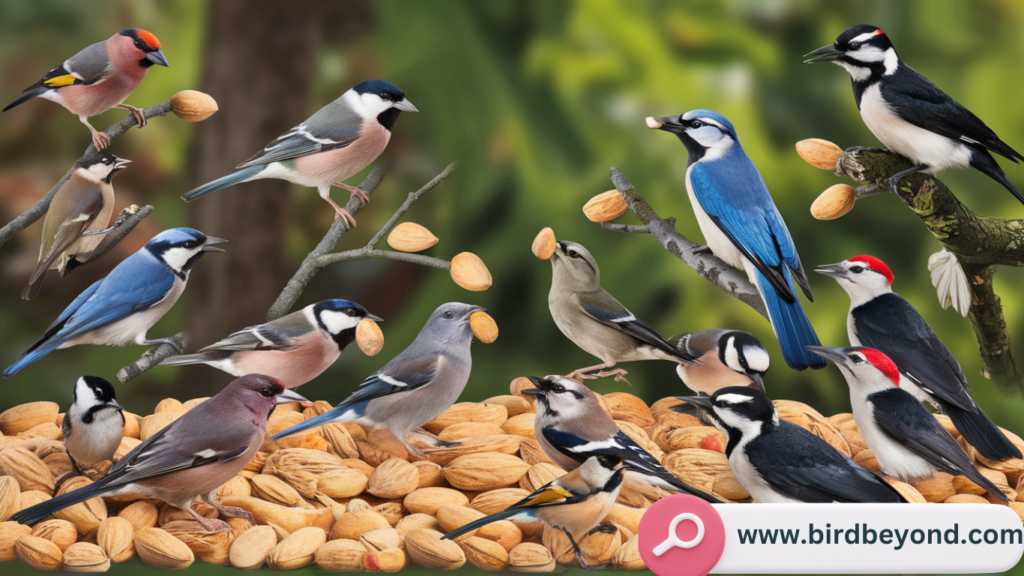
Not all bird species are equally well-suited to consume “can birds eat almonds.” Let’s explore which feathered friends are most likely to enjoy this nutty treat safely:
Common Backyard Birds
Many of the familiar birds that frequent our backyards and feeders can potentially benefit from “can birds eat almonds” in moderation:
- Songbirds: Species like finches, sparrows, chickadees, and titmice may relish small, chopped-up pieces of can birds eat almonds as a supplemental food source.
- Jays and Crows: Larger birds like blue jays, gray jays, and American crows have the beak strength to crack open and consume whole can birds eat almonds.
- Woodpeckers: These tree-dwelling birds, including the downy woodpecker and the red-bellied woodpecker, may also partake in “can birds eat almonds,” especially when offered in a suet or seed mix.
The size and beak type of the bird are critical factors in determining whether whole or chopped can birds eat almonds are the safest option. Smaller songbirds may do best with finely chopped pieces, while larger birds can typically handle whole can with ease.
Exotically and Caged Bird Species
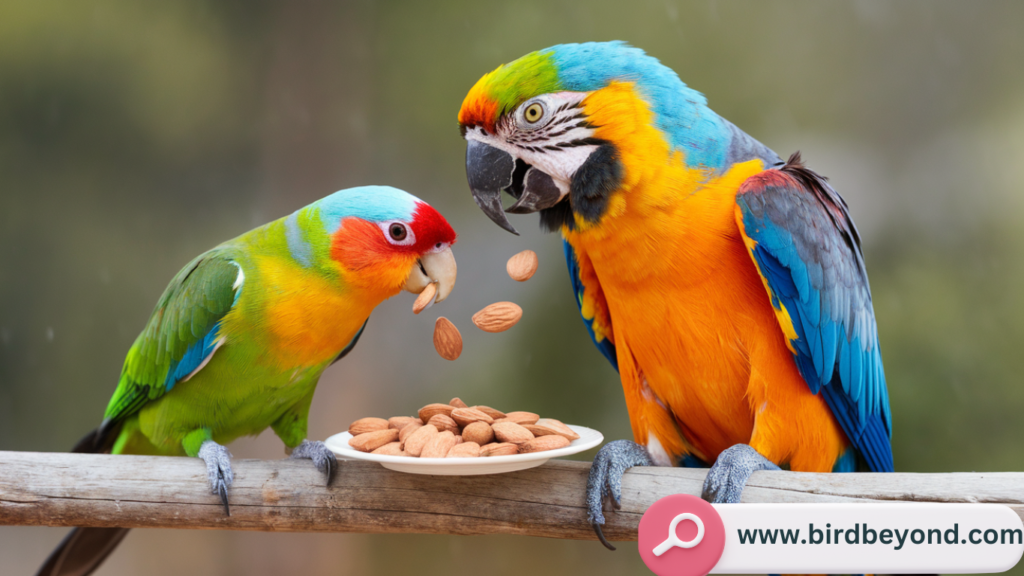
When it comes to more exotically or caged bird species, the suitability of their diet can vary:
- Parrots and Parakeets: These intelligent, bird-brained companions may enjoy the taste and texture of nuts should be served in moderation due to their high fat content.
- Cockatoos and Macaws: Larger parrot species with powerful beaks can safely crack and consume whole can birds eat almonds, but owners should monitor portion sizes carefully.
As with any new food item, it’s crucial to introduce “can birds eat almonds” gradually and observe your bird’s individual response before incorporating them into their regular diet.
Safely Serving Almonds to Birds
If you’ve determined that “can birds eat almonds” are a suitable treat for the bird species in your care, there are a few important steps to take when preparing and presenting them.
Preparation Methods
- Shelling and Chopping: Remove the hard outer shell of the can chop the nuts into smaller, bite-sized pieces to prevent choking hazards, especially for smaller birds.
- Mixing with Other Foods: Combine the chopped can other bird-safe foods, such as seeds, suet, or fruit, to create a nutritious and appealing mix.
- Avoiding Seasonings: Steer clear of adding any salt, sugar, or other seasonings to the can birds eat almonds, as these can be harmful to birds.
Portion Sizes and Frequency
When it comes to feeding to birds, moderation is key. Offer only small amounts, perhaps a teaspoon or two per feeding, and gradually increase the portion if the birds seem to enjoy and tolerate well. Avoid making can birds eat almonds the sole or primary component of a bird’s diet, as they should be considered a supplemental treat rather than a staple food.
Presentation and Feeding Methods
There are several ways to offer “can birds eat almonds” to your feathered friends:
- Feeders: Place the chopped can in a specialized bird feeder or mix them into a seed or suet blend.
- Platforms: Scatter the can birds eat almonds pieces on a flat platform or tray feeder, making them easily accessible for larger birds.
- Ground Feeding: For ground-foraging species, you can simply sprinkle on the ground in a designated feeding area.
Experiment with different presentation methods to see what works best for the birds in your backyard or aviary.
Deterring Unwanted Animal Visitors
One potential downside of offering “can birds eat almonds” to birds is that it may also attract the attention of other, less welcome guests, such as squirrels, raccoons, or even bears in some areas. To deter these unwanted visitors, consider the following strategies:
- Squirrel-Proof Feeders: Invest in bird feeders designed to be squirrel-resistant, with weight-sensitive perches or enclosures that prevent larger animals from accessing the contents.
- Placement and Location: Position your -containing feeders or platforms in areas that are less accessible to ground-dwelling pests, such as on poles or hangers away from trees and fences.
- Scent Deterrents: Apply natural repellents like cayenne pepper or citrus-based sprays around the feeding area to discourage unwanted visitors.
By taking these precautions, you can help ensure that the can birds eat almonds you provide are enjoyed by your intended feathered guests, without unwanted furry or feathered competitors.
Embracing Almonds for Avian Enjoyment
In summary, while “can birds eat almonds” can be a nutritious and enjoyable treat for certain bird species, it’s essential to approach feeding them with caution and care. By understanding the potential benefits and risks, choosing the right preparation methods, and monitoring portion sizes, you can safely incorporate almonds into your bird-feeding regimen.
Final Considerations
When adding almonds to the diets of our feathered companions, it is important to prioritize a balanced approach. Almonds should be viewed as a supplementary treat rather than a primary food source. A diverse diet for birds is key to their overall health and well-being.
Observing Bird Behavior
As bird enthusiasts, we have the unique opportunity to observe how different species respond to new foods. Pay attention to the reactions of your feathered friends when you introduce almonds. Some birds may quickly embrace this nutty delight, while others might be more hesitant. Each bird has its own preferences, and understanding these can enhance the feeding experience for both you and your avian visitors.
the Benefits of Variety
Ultimately, the joy of feeding birds lies not just in offering a single food item but in creating a varied and nutritious menu that caters to the diverse needs of our backyard visitors. Alongside almonds, consider providing a mix of seeds, fruits, vegetables, and specially formulated bird feeds to ensure that your feathered friends receive a well-rounded diet.
By fostering an environment that prioritizes the health and happiness of birds, you contribute to their well-being and enjoy the beauty and wonder they bring to our lives. So, go ahead and offer those almonds—with the right preparation and a mindful approach, you can create a delightful dining experience for the birds that brighten your day. Happy birdwatching!
Tips for Bird Lovers: Enhancing Your Avian Experience
As bird lovers, fostering a healthy and inviting environment for our feathered friends is essential. Here are several practical tips to enhance your birdwatching experience and support avian health.
1. Create a Bird-Friendly Habitat
Native Plants
Planting native trees, shrubs, and flowers can provide essential food sources and shelter for local birds. These plants often attract insects that serve as a natural food source.
Water Source
Install a birdbath or shallow water feature to provide fresh water for drinking and bathing. Regularly clean the water source to keep it free from algae and contaminants.
2. Provide a Balanced Diet
Variety of Foods
Offer a range of food options, including seeds, fruits, and insects, to meet the diverse dietary needs of different bird species.
Fresh Offerings
Regularly replace old food to prevent spoilage and mold, ensuring that the birds receive fresh and nutritious meals.
3. Use Quality Feeders
Durability
Choose feeders made from sturdy materials that can withstand various weather conditions and deter larger animals from accessing the food.
Easy to Clean
Opt for feeders that can be easily disassembled for thorough cleaning, which is crucial for preventing disease among the birds.
4. Observe Without Disturbance
Quiet Viewing
Maintain a calm environment when observing birds to avoid scaring them away. Enjoy their natural behaviors by being as unobtrusive as possible.
Distance Matters
Use binoculars or a camera with a zoom lens to enjoy close-up views of birds without intruding on their space.
5. Keep Cats Indoors
Protect Wildlife
Keeping pet cats indoors helps protect local bird populations from predation, allowing them to thrive in their natural habitats.
6. Be Mindful of Window Collisions
Window Treatments
Use window decals, screens, or netting to reduce the risk of birds flying into glass, which can lead to injury or death.
7. Learn About Local Species
Identification Guides
Utilize field guides or mobile apps to learn about local bird species and their behaviors, enhancing your understanding and appreciation.
Feeding Preferences
Research which foods attract different types of birds in your area, allowing you to cater your offerings more effectively.
8. Participate in Citizen Science
Data Collection
Join local birdwatching groups or participate in bird counts to contribute to conservation efforts and help track bird populations.
9. Monitor Bird Health
Signs of Illness
Learn to recognize signs of illness in birds, such as unusual behavior or changes in feeding habits, to address potential health issues promptly.
Consult Experts
Seek advice from avian veterinarians if you notice any health concerns, ensuring that your birds receive proper care.
10. Stay Educated
Workshops and Courses
Attend workshops or courses on birdwatching, feeding, and conservation to enhance your knowledge and skills.
Online Resources
Utilize websites and forums dedicated to bird enthusiasts for tips, sharing experiences, and connecting with fellow bird lovers.
Frequently Asked Questions
Can Baby Birds Eat Almonds?
Young, nestling birds should generally not be fed “can birds eat almonds,” as their delicate digestive systems may not be able to handle the high fat and protein content. It’s best to stick to specialized baby bird formulas or soft, easily digestible foods during the critical early stages of development.
Are Almond Extracts or Oils Safe for Birds?
While whole, raw can birds eat almonds can be a safe treat for many bird species, almond extracts, oils, and other almond-derived products may not be suitable. These concentrated forms can potentially contain harmful compounds or additives that could be toxic to birds. It’s safest to stick to the whole nut form when feeding “can birds eat almonds” to your feathered friends.
Should I Offer Almonds Year-Round?
“Can birds eat almonds” can be a great addition to a bird’s diet, but they should not necessarily be provided year-round. Instead, consider offering them as a seasonal or occasional treat, particularly during times of the year when birds may have higher energy and nutrient needs, such as during migration or breeding seasons. Moderation is key to ensuring that can birds eat almonds complement, rather than compromise, a bird’s overall balanced diet.
Real-World Case Studies: Almonds and Backyard Birds
To better understand the practical implications of feeding to birds, let’s explore a few real-world case studies:
Blue Jays and the Almond Feast
In a suburban neighborhood in the Midwest, a bird enthusiast noticed that the local blue jays were particularly fond of the can birds eat almonds she had been sprinkling on her platform feeder. Intrigued, she conducted a small experiment, offering both whole and chopped to see which the jays preferred. The birds eagerly consumed the chopped but they also expertly cracked open and enjoyed the whole nuts. Careful monitoring revealed no adverse effects, and the blue jays remained regular visitors to the almond-enriched feeder.
Recent Posts Might You Like

William Henry is a distinguished blogger with a flair for avian storytelling. With a wealth of experience, he delivers captivating insights and expert knowledge to Bird Beyond. William’s passion for birds and his engaging writing style make him a standout voice in the birdwatching community, offering readers both valuable information and delightful narratives.

